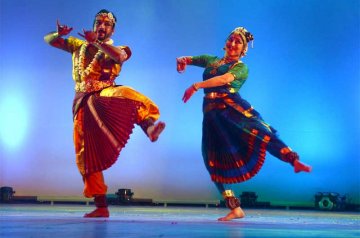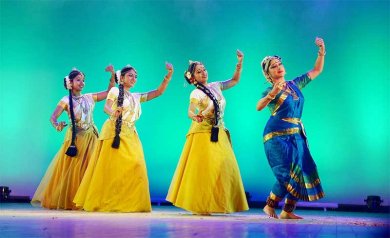
|   |

|   |
Poonthanam’s Jnanappana comes alive on stage - G. Ulaganathan e-mail: ulag_nath@yahoo.com September 23, 2016 When two well-known film stars come together to perform a dance drama one goes with a little skepticism and expect cinematic gimmicks to dominate. Fortunately for the rasikas in Bangalore, actors Vineeth and Lakshmi Gopalaswamy presented a graceful recital based on the 16th century poem Jnanappana this month before the Cauvery agitation and unrest halted many other cultural programs. Jnanappana, a work by the Malayalam poet Bhaktha Kavi Poonthanam Namboothiri, has been a favourite of Vineeth and he has worked hard to choreograph and present this gripping tale. Performed first in Kerala around a year ago, Vineeth brought his team to Bangalore and the show was supported by The Art of Living Foundation and was intended as fund-raiser for Vishranthi Trust for senior citizens and children. While Vineeth himself played the lead role as Poonthanam, he was accompanied with aplomb by the graceful Lakshmi Gopalaswamy. 

Poonthanam, it is believed, wrote the Jnanappana, soon after losing his child within a few days of its birth. Overcome by sorrow and grief, the production begins with the wailing of the women folk, the funeral pyre and the helpless father going into a trance. It is with this episode Vineeth began the performance. Clad in white as a devout Namboothiri, Vineeth appears as Poonthanam on his child’s annaprashnam day (the day when the child is fed its first morsel). Soon, we hear his wife’s cries and it is revealed that the child is no more, leaving the couple shattered. Musical score by Sharreth enhanced the gravity of the situation effectively. The mother, her condition after the tragedy and child’s funeral were depicted through shadow play. It was a clever move on the part of Vineeth to avoid showing death on stage. But to the audience it had an element of shock and it is quite depressing when the dance drama begins with a tragedy. Though the poet begins the work with the death, one felt that the choreographer could have used his artistic liberties to set a happy mood, perhaps a solo dance in praise of Lord Krishna. After the dramatic start, Poonthanam discovers the poet in him. The phrase unnikrishnan manasil kalikumbol,unnikal mattu venamo makkalai (When there is Krishna in your heart, do you need children of your own?) transforms him and he soon gets over his personal tragedy. Shyamini as little Krishna brings about this transformation. As Poonthanam sees this little Krishna, he begins to gather courage and seeks refuge in his God. As he goes closer to the lord, Poonthanam sees Krishna within himself, and realizes the purpose of human existence. As dancers give life to his philosophical metaphors and divine imagery, the brilliance of Vineeth and Lakshmi as dancers was in full flow. While Vineeth was full of energy and was like a live wire, Lakshmi proved to be an admirable foil oozing charm and grace. The beautiful dancer was in full flow with classical Bharatanatyam adavus as well as sancharis. Considering the fact that it is difficult to cover the entire work in a two hour concert, Vineeth did well to increase the pace of the dance numbers. While those who could follow Malayalam had no problem in understanding the philosophical connotations, those who were not familiar with the language had some difficulty going with the tide. Perhaps some explanation in English midway could have been of some help. The only cinematic element came in the final scene, where the rituals and darshan of Lord Guruvayurappan was created on stage rather elaborately. Special credit must go to the little children of Uthara Antharjanam’s dance school who were dressed as little Krishnas. They also stole the show. Another notable contribution was from singer K.S. Chitra whose voice was quite in keeping with the bhakti element which formed the backdrop to this impressive production. G. Ulaganathan is a senior writer and journalist based in Bangalore. |